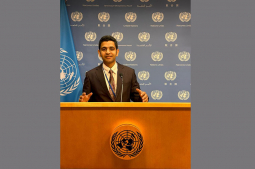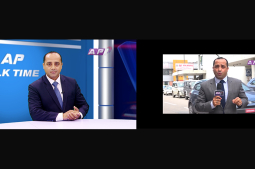'Ramailo Games' promotes local content and family games
1 year ago
Sr. correspondent at Republica.

Photos:Shahin Sunuwar Rasaili/Republica
It is said that the lines on your palms decide your destiny. But it cannot mandatorily be everybody’s truth. Isn’t there any destiny for those who don’t have palms? Of course, there is, even though they are without palms. Thirty-two years old Surendra Khatri is a living example who created his own destiny. He is one of the war survivors among many others who were disabled during the Maoist insurgency.
Khatri is from Myagdi, Beni. He is currently the President of National Network of Disabled Conflict Victims, and also a father of two children. Khatri is hopeful for his future and also the destiny of many others like him, who not only suffered physically but emotionally as well. Their dreams shattered to pieces and their lives turned upside-down forever.
Despite being the victims of conflict, because they are civilians, they never received compensations of any kinds from the government for what had happened to their lives and the lives attached to them. Though the civil war came to an end in 2006, the sufferings of the war-victims still have not finished. The various difficulties they face and how they are coping with their lives now are on an exhibition titled ‘14 Stories: Living Memories of War’. The exhibition kicked off on Tuesday at Staff College, Jawalakhel where it also features the audio along with photographs of survivors.
Meanwhile, Khatri shares about the exhibition, “Government has failed to address us, the civilians, who suffered disabilities due to civil war. We don’t belong to any side. That might be why the government has neglected us. Moreover, we also felt that we need to speak up for ourselves and for our rights. This exhibition is a documentation of our lives and we don’t want us to be forgotten just like that. We too are the part of history and our stories are the reminders what can happen if there is war in the country.”
Khatri lost both his hands on June 26, 2006 in a bomb blast while picking up a colorful packet, unknown about the fact that it was an explosive material left in the jungle. He was in the jungle to graze his goats. He was then looking forward to joining the Indian Army. He was also the father of a three-month-old daughter; and a tenth grader who didn’t pass the exam at that time. He expressed, “I could not join the army as I was disabled and that was the only thing I had been preparing myself for. I was devastated. But my wife took good care of me at that time.”
If he keeps his hands in his pocket, you won’t notice he is disabled. He has the confidence and a personality that gives a positive vibe for life. Even though he has to go through every day war, he is hopeful for a prosperous life. About his confidence in him, he said, “I live my life believing I am capable and this very feeling helps me fight my battles. When I learned about heart rendering condition of many other friends, I felt grateful that I still can walk, talk and express myself. I don’t have any regrets. But it took me around seven years to gain my confidence to rely on my hands without palms.”
Moreover, his story was published in a popular newspaper and an Australian citizen came forward to help him with his treatment. He stayed in Australia for three months where he got his treatment along with skills like driving and using a computer. This too boasted his confidence and his capability as well. “Learning new skills helped me gain a new perspective in life and I became hopeful that I can do anything and can help others like me.”
Likewise, with understanding the need for education and its power, he enrolled himself to school and currently is studying in BA second year at Myagdi College. “I missed many opportunities in my life due to lack of academic qualification. So understanding this need I started to study. And I can write, use computer and more,” Kharti expressed.
Currently, his daughter is 13-year-old and son is 11. He is worried about their future. He does not have a stable job and the project he used to work has come to an end. His wife divorced him recently. He added, “When my wife left me, it was like a second bomb blast in my life. But I do understand her and I don’t have any hard feelings for her. And my only concern is about the income source and the future of my children.”
He believes that if the government could understand his skills and give him works according to his capability, then that’s justice for him. And almost all of the featured survivors’ concern is on getting proper income generating source.
The exhibition showcasing stories of 14 different conflict-survivors was produced by photo.circle. The storyteller went on tour in coordination with Conflict Victims Common Platform and local victims’ organizations at the end of 2018. Also, the exhibition includes a short documentary about this journey and the responses of people who saw the photo exhibition in seven districts.
A parallel program of discussions, film screenings and workshops are running alongside the exhibition till Saturday in collaboration with different organizations.





- by Republica

- by Republica

- by Republica

Leave A Comment